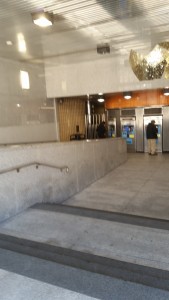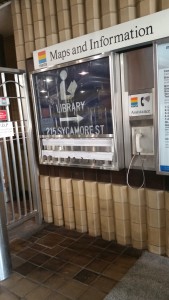An Anthology of Annotated Bibliography.
- Ohmer, Mary L., Warner, Barbara D. Beck Elizabeth.”Preventing Violence in Low-Income Communities: Facilitating Residents’ Ability to Intervene in Neighborhood Problems.”Journal of Sociology & Social Welfare. 37.2 (2009): 162. Advanced Placement Source. Web. 5 Feb. 2016.
This article was written by two Social Work professors and one Criminal Justice professor, the article talks about crime and crime prevention in low income areas. The article start with talking about how something in the past have proven to bring down crime and make things safer, but it also addresses the problems of how somethings that helped another neighborhood may not be able to help another. The authors wrote this to help in identifying problems in a community and to help stop them, for people who protect neighborhoods and for neighborhoods to protect themselves. This article will help in my research of violence in poor areas and how poor or low income deal with the problems in their society. This article is an Academic Journal wrote by people who are experts in their fields who have done many studies on the subjects of criminal justice in more poor areas.
-
Oakley, Deirdre. Ruel, Erin. Reid, Lesley. “Atlanta’s Last Demolitions and Relocations: The Relationship Between Neighborhood Characteristics and Resident Satisfaction.” Housing Studies. 28.2(2013): 205. Advanced Placement Source. Web. 5 Feb, 2016.
All three of the writers of this article are Sociology professors, the article talks about how moving a community out of a lower income area to better neighborhoods will increase their happiness, helpfulness to society, and their ability to make money and have a job. The people who were moved were moved to safer areas, which allowed them to live longer and live happier. This change caused a drop in crime rate for that area and in turn for the whole city as well. The authors wrote this to inform people on how changes in a person environment can change a person’s whole attitude. This article will help in my study of crime and how to stop crime in low income areas around Atlanta. This article was wrote by professors who are experts on human interaction in societies and communities.
- Mehta, Chirag. Theodore, Nik. “WORKPLACE SAFETY IN ATLANTA’s CONSTRUCTION INDUSTRY: INSTITUTIONAL FAILURE IN TEMPORARY STAFFING ARRANGEMENTS.” WorkingUSA. Spring2006.9.1(2006): 59. Business Source Complete. Web. 5 Feb 2016.
Both the writer of this article work with constructing buildings, the article talks about the issues in safety during building and how hazardous building builds and communities can be. The article has many diagrams and graphs that it uses to show that these companies will cut corner and use loops in things to avoid spending extra money on safety items. The article has many surveys they did to prove their facts. This article will help me by showing me how neighborhoods are formed and how sometimes buildings are not build right due to company negligence, which in turn leads them to being cheaper and creating more dangerous neighborhood and crime. This article is wrote by experts in the construction field who used many surveys to prove their facts, which means that everything in this survey is trustworthy and factual.
- Inwood, Joshua F.J. “CONSTRUCTING AFRICAN AMERICAN URBAN SPACE IN ATLANTA, GEORGIA.” Wiley Blackwell. 101.2(2011):147-163. Environment Complete. Web. 24 Feb, 2016.
The paper is talks about an urban redevelopment scheme by Big Bethel ame Church. Their plan was the turn the adjacent city block into a more diverse grouping of races. The adjacent city block, Auburn Avenue, is a very historically significant African American business area in the United States. I choose this source to gain a better idea of how areas are raced, and to be able to see things through a different persons eyes who had a different background. The only sort of flaw I found was the paper was wrote in a semi-biased. The paper is wrote from the point of view of one of the people from Big Bethel ame Church, though this does not take away from my research due to it being a gathering of other’s views. This source over all help with my research of safety and the idea of bringing people together for the betterment of a community.
- Reitzes, Donald C., Crimmins, Timothy J., Yarbrough, Johanna, Parker, Josie. “Social support and social network ties among the homeless in a downtown Atlanta park.” Journal of Community Psychology. 39.3(2011)274-291. Wiley. Web. 24 Feb, 2016.
This article talks about the problems the homeless face, how they find help, and how they find support and a sense of community. The article explain how homelessness effects other races and gender now more than ever, and how the homeless come together from support. They make there homeless brothers and sisters into their families, and they help each other with normal task or just giving them a normal conversation. This article hits on the same topic of homelessness, though this article talks more about their realities and how they help each other rather than where they live and what a person could consider a home. The only weaknesses that existed throughout this paper was the feeling it wasn’t talking all the bad sides of the homeless. I picked this source because it deals with the sense of community that I’m trying to research, and it also kind of hit on the topic of safety.
- Ihlanfeldt, Keith R. “Rail Transit and Neighborhood Crime: The Case of Atlanta, Georgia”. Southern Economic Journal 70.2(2003)273-294.JSTOR Journals. Web. 24 Feb, 2016.
This article talks about how the addition of new rail rod stations causes an influx of crime and violence on surrounding neighborhoods. The Railroads are used as easy transit to a new area where they commit crime, though this displacement caused by this also decreases the crime in the areas where these people were originally from. This article give incite on other’s points of view, and also explains how some people who used to live in crime free areas are now being plunged into a world of crime by urbanization. The weakest point of this whole paper is the fact that you never know if the research they did was skewed by some other means such as just random coincidence. This paper related to all the other reach I’ve done about safety and building of communities. One of the parts that brings up community is how the communities will band together and object to a new rail way being put in.
- ENGLISH, CRYSTAL. “Three Beats, Two Crimes, One City: Place-Based Distribution of Property Offenses in Atlanta, Georgia.” Yearbook of the Association of Pacific Coast Geographers. 73.16(2011): 79-90. California State University, Northridge. Web. 25 Mar. 2016.
This source tells me about how much crime has happen in the years around 2011 and earlier. The highest spike in criminal activity being in the year of 2008, which was almost 25 percent higher than the previous year. This source studied which areas of Atlanta has the most crime, where, and maybe why can be draw from that. I picked this source because of how it talks about where crime is, what may have caused it, and how it compares to the years prior. The source is a bit dated due it the info being from 2011, 5 years ago, but it does show a good point of what and where crime may happen. It is a good example of how to stop crime. This source relates to all of my other, due to the content being about crime and safety. This source better helps me understand what crime is, where it is, and what could be done to make Atlanta a safer place to life.
- RUSHIN, STEPHEN. “USING DATA TO REDUCE POLICE VIOLENCE.” Boston College Law Review. 1.50(2016) 117-166. Assistant Professor, University of Alabama School of Law. Web. 25 Mar 2016.
This article talks about the reduction of police violence and how to do it. The article talks about many of the laws pasted that help prevent people from being beaten to death by the police, like Death in Custody Reporting Act in 2014, which was for people who died in police custody. This helps me better understand how we can help prevent unnecessary deaths that happen in today’s society in cities like Atlanta. The author talks about things that have been passed in the past to helps, and this source helps support my ideas on how to make things more safer in a community and how to stop crime. This source doesn’t exactly give a way to fix death done by police but gives a good idea about what is being done to help prevent it. This source relates to my study of communities, the crime that happens in areas, and how to make places safer for the betterment of society as a whole.
- Gillespie, Wayne. “Thirty-Five Years After Stonewall: An Exploratory Study of Satisfaction with Police Among Gay, Lesbian, and Bisexual Persons at the 34th Annual Atlanta Pride Festival.” Journal of Homosexuality. 55.29(2008)619-647. LGBT Life with Full Text. Web. 25 Mar 2016.
This article discusses the unique relationship the police have had with the LGBT community since 1969. This study explores and explain show the police have felt toward the LGBT community and how mind sets have started to change and how things over time become more acceptable. The article talks about the gay rights movement, which began in the summer of 1969 when gay men rioted against police for raiding a bar known as the Stonewall Inn. This source helps explain how community have interacted in the past and today. The article main just talks about how they have interacted and how things have changed. This source helps me better understand community’s relationship and how community get along as a whole. This helps with my gather of sources for communities and my gathering of sources on how to make society safer.
- Keyes, Laura; Rader, Carolyn; Berger, Cathie. “Creating Communities: Atlanta’s Lifelong Community Initiative.” Physical & Occupational Therapy in Geriatrics (PHYS OCCUP THER GERIATR)29.16(2011)59-74. CINAHL Plus with Full Text. Web. 25 Mar 2016
The source talks about how the communities of Atlanta are changing and growing older and these older communities need a place to grow at. It talks about The Atlanta Regional Commission (ARC), which developed the Lifelong Communities Initiative to helps meet the changing needs of these growing and aging communities. This source relates to how communities interact and how they grow and strive. This source relates to all my other source in the fact that it talks about communities. This source is very idealistic, but does explain plans on how to better help the growing community and what The Atlanta Regional Commission does. The article is more of an ultimate goal to strive for in meeting the needs of the growing communities in Atlanta. With this source and my other source they all work together on how to make a better society with less violence and more community understanding.
- (No Works Have Been Edited Since Their Original Posting.)


